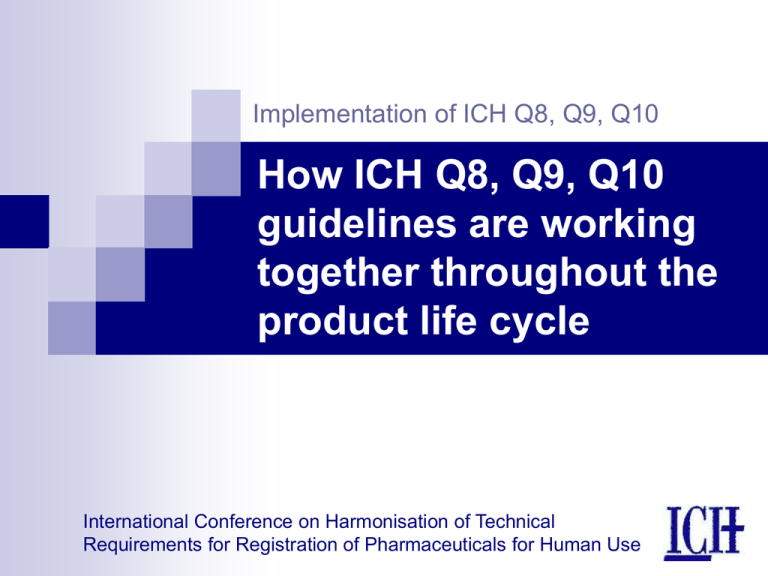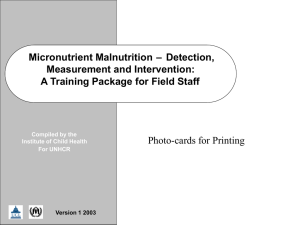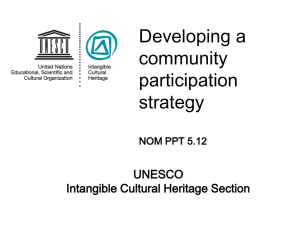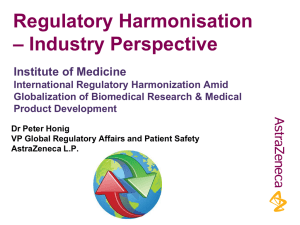Case Study - xyz
advertisement

Implementation of ICH Q8, Q9, Q10 How ICH Q8, Q9, Q10 guidelines are working together throughout the product life cycle International Conference on Harmonisation of Technical Requirements for Registration of Pharmaceuticals for Human Use ICH Quality Implementation Working Group - Integrated Implementation Training Workshop How ICH Q8, Q9, Q10 guidelines are working together throughout the product life cycle Outline • Workshop Goals and Objectives • ICH Q8, Q9 & Q10 • How the guidelines are working together throughout the product life cycle • Utility of ICH Q8, Q9 & Q10 • Key messages • Conclusion © ICH, November 2010 slide 3 ICH Quality Implementation Working Group - Integrated Implementation Training Workshop How ICH Q8, Q9, Q10 guidelines are working together throughout the product life cycle Workshop Goals and Objectives • This presentation is intended to outline the linkage between Q 8,9 &10 and how the guidelines are working together • This presentation is NOT intended to outline regulatory expectations (assessment and/or inspection) • This workshop will: - Provide training on the integrated implementation of Q 8, Q9 and Q10 Allow participants to share implementation strategies and experiences Seek participants’ input and identify implementation issue and concerns © ICH, November 2010 slide 4 ICH Quality Implementation Working Group - Integrated Implementation Training Workshop How ICH Q8, Q9, Q10 guidelines are working together throughout the product life cycle ICH Q8, Q9 and Q10 Nov 2005 & Nov 2008 • High level guidances (not prescriptive) • Science and risk-based • Encourages systematic approaches • Applicable over entire product lifecycle • Intended to work together to enhance pharmaceutical product quality © ICH, November 2010 slide 5 ICH Quality Implementation Working Group - Integrated Implementation Training Workshop How ICH Q8, Q9, Q10 guidelines are working together throughout the product life cycle Pharmaceutical Development - Q8(R2) • Describes science and risk-based approaches for pharmaceutical product and manufacturing process development • Introduced concepts of design space and flexible regulatory approaches • Introduced concepts of Quality by Design (QbD) and provided examples of QbD development approaches and design space © ICH, November 2010 slide 6 ICH Quality Implementation Working Group - Integrated Implementation Training Workshop How ICH Q8, Q9, Q10 guidelines are working together throughout the product life cycle Q8(R2) - Example QbD Approach Product Profile CQA’s Risk Assessments • Quality Target Product Profile (QTPP) • Determine “potential” critical quality attributes (CQAs) • Link raw material attributes and process parameters to CQAs and perform risk assessment Design Space Control Strategy Continual Improvement © ICH, November 2010 • Develop a design space (optional and not required) • Design and implement a control strategy • Manage product lifecycle, including continual improvement slide 7 ICH Quality Implementation Working Group - Integrated Implementation Training Workshop How ICH Q8, Q9, Q10 guidelines are working together throughout the product life cycle Quality Risk Management – Q9 • Describes systematic processes for the assessment, control, communication and review of quality risks • Applies over product lifecycle: development, manufacturing and distribution • Includes principles, methodologies and examples of tools for quality risk management • Assessment of risk to quality should: - Be based on scientific knowledge - Link to the protection of the patient - Extend over the lifecycle of the product © ICH, November 2010 slide 8 ICH Quality Implementation Working Group - Integrated Implementation Training Workshop How ICH Q8, Q9, Q10 guidelines are working together throughout the product life cycle Quality Risk Management Process - Q9 Process Development Control Strategy Development Continual Improvement of the product © ICH, November 2010 slide 9 ICH Quality Implementation Working Group - Integrated Implementation Training Workshop How ICH Q8, Q9, Q10 guidelines are working together throughout the product life cycle Pharmaceutical Quality System - Q10 • Describes key systems that facilitate establishment and • • • maintenance of a state of control for process performance and product quality Facilitates continual improvement Applies to drug substance and drug product throughout product lifecycle Sound pharmaceutical development (Q8R(2)) in combination with a robust PQS (Q10) provide opportunities for flexible regulatory approaches. Relevant PQS elements include systems for: - Track and trend product quality Maintain and update models as needed Internally verify that process changes are successful © ICH, November 2010 slide 10 ICH Quality Implementation Working Group - Integrated Implementation Training Workshop How ICH Q8, Q9, Q10 guidelines are working together throughout the product life cycle Pharmaceutical Quality System - Q10 © ICH, November 2010 slide 11 ICH Quality Implementation Working Group - Integrated Implementation Training Workshop How ICH Q8, Q9, Q10 guidelines are working together throughout the product life cycle ICH Q8, Q9 and Q10 Working Together Q10 Pharmaceutical Quality Systems © ICH, November 2010 Q9 Quality Risk Management Manufacturing Activities: • Commercial Scale Manufacturing • Batch Release • Continual Verification & Improvement Q8 Pharmaceutical Development Formulation Activities: • QTPP Definition • Pre-Formulation Studies • Formulation Screening • Optimization & Selection Process Development Activities: • Process Screening • Lab Scale Development • Scale-Up Studies slide 12 ICH Quality Implementation Working Group - Integrated Implementation Training Workshop How ICH Q8, Q9, Q10 guidelines are working together throughout the product life cycle How can the three guidelines work together • The following four slides (slides 14-17) are intended to show how Q8, Q9, Q10 can work together at different stages of the product lifecycle • It is important to note that they are NOT intended to show complete activities at each stage NOR to show the exact timing (stage) for those activities © ICH, November 2010 slide 13 ICH Quality Implementation Working Group - Integrated Implementation Training Workshop How ICH Q8, Q9, Q10 guidelines are working together throughout the product life cycle Formulation Development Activities ICH Q8(R2) – Pharmaceutical Development Related Activities ICH Q9 – QRM Related Activities ICH Q10 – PQS Related Integrated Activities Quality Target Product Profile (QTPP) • Clinical and non-clinical studies on drug • Informal and/or formal risk • Knowledge Management / Pre-Formulation Studies • Characterization of drug substance (physical properties) • Chemical stability of drug substance, degradation and potential formulation interactions • Development of analytical tests factors for drug substance physical and chemical stability Formulation Screening • Excipient compatibility • Dissolution method development • Screening DOEs • Excipient and drug substance material • Determine failure modes and risk Formulation Optimization and Selection substance: bioavailability, PK/PD, and safety property & characterization • DOEs for excipient amounts • Stability of drug product and storage conditions • Develop IVIVC relationships © ICH, November 2010 assessment to evaluate patient needs and potential medication risks • Determine failure modes and risk Prior Knowledge (relevant information to support the understanding, risk assessment and scope of DOE) - Laboratory note book documentation - Development report - Etc… factors for excipient interactions • Opportunities for formal risk assessment slide 14 ICH Quality Implementation Working Group - Integrated Implementation Training Workshop How ICH Q8, Q9, Q10 guidelines are working together throughout the product life cycle Process Development Activities Process Screening ICH Q8(R2) – Pharmaceutical Development Related Activities ICH Q9 – QRM Related Activities ICH Q10 – PQS Related Integrated Activities • Exploration of unit operations • Characterization of process • Determine failure modes, risk factors • Batch records and operational guidelines for manufacturing • Tech Transfer report • Identification and selection of suppliers that meet raw material needs for unit operations and rank risk intermediates Process Development and Optimization (Lab Scale) • DOEs for process parameters and • Screening risk assessment to interactions with material attributes • Development of Design Space • Operational ranges for scaleindependent parameters • understanding of critical process operations determine potential parameters impacting product quality (e.g., Ishikawa) • Determine critical process steps, process parameters and material attributes (e.g., FMEA) • Potential issues of scale Process Development and Optimization (Pilot Scale) • Pilot to verify lab scale knowledge • DOE and modeling effects of scale • Development of design space • Development of on-line • Development of control strategy to control risks incl. for scale up measurement technologies © ICH, November 2010 slide 15 ICH Quality Implementation Working Group - Integrated Implementation Training Workshop How ICH Q8, Q9, Q10 guidelines are working together throughout the product life cycle Technology Transfer ICH Q8(R2) – Pharmaceutical Development Related Activities ICH Q9 – QRM Related Activities ICH Q10 – PQS Related Integrated Activities • Gain product and process knowledge • Knowledge supports transfer between • Forms the basis for the manufacturing • Advance understanding through scale- process • Improves effectiveness of control strategy • Contributes to processes validation and ongoing continual improvement up activities • Provide preliminary indication of process performance and successful integration into manufacturing • Gain knowledge from transfer and scale up activities to enhance the basis for the control strategy development and manufacturing to achieve product realization © ICH, November 2010 slide 16 ICH Quality Implementation Working Group - Integrated Implementation Training Workshop How ICH Q8, Q9, Q10 guidelines are working together throughout the product life cycle Commercial Manufacturing Activities Commercial Scale Manufacturing for Drug Product ICH Q8(R2) – Pharmaceutical Development Related Activities • Definition of commercial ICH Q9 – QRM Related Activities • Development of a control ICH Q10 – PQS Related Integrated Activities • Process-specific operating strategy for commercial manufacturing, including inprocess controls, end-product testing, raw material controls and change control • Check procedures in the PQS regarding risk from Process specific procedure (e.g., sampling plans, design space and model verification, change control for movement within design space) procedures (e.g. sampling plans, design space etc.) • Documentation to support on-line testing methods • Validation to demonstrate process and analytical method reproducibility • Storage of development reports, risk assessments • On-going analysis and trending • Manage risks of process or • Procedures on process of process data, (multivariate SPC, etc.) • Evaluation of process changes and associated effect on intermediates and products material attribute change (including changes within or outside of design space) • Review risks in audits/inspections and implement risk-based CAPAs monitoring and action limits • Change control procedures including how and when to do risk assessment for process changes and evaluation of the change • Maintenance and update of knowledge management process design • Commercial scale runs to verify process design, with additional sampling to verify understanding • Implementation of on-line measurement technologies Continual Process Verification and Continual Improvement © ICH, November 2010 slide 17 ICH Quality Implementation Working Group - Integrated Implementation Training Workshop How ICH Q8, Q9, Q10 guidelines are working together throughout the product life cycle The Utility of ICH Q8, 9 &10 • The implementation of Q8, 9 &10 is valuable for all drug products, pharmaceutical development approaches and regulatory systems - New/innovator, marketed/legacy and generics Simple and complex dosage forms Small molecule and biotech Traditional development and QbD Within and outside ICH regions • Good scientific development (Q8) in combination with QRM (Q9) and PQS (Q10) will improve drug quality and efficiency of pharmaceutical manufacturing - Quality is important for all drug products throughout product lifecycle (new, legacy and generics) © ICH, November 2010 slide 18 ICH Quality Implementation Working Group - Integrated Implementation Training Workshop How ICH Q8, Q9, Q10 guidelines are working together throughout the product life cycle Key Messages • ICH Q8, Q9 and Q10 are linked together to provide a systematic, modern risk- and science- based approach to pharmaceutical manufacturing and development • Comprehensive implementation of the three guidelines together is essential to achieve ICH Quality Vision - Guidelines are applicable over entire product lifecycle • Guidelines can be utilized by all stakeholders - Industry and regulators Assessors and inspectors are expected to incorporate QRM during regulatory processes © ICH, November 2010 slide 19 ICH Quality Implementation Working Group - Integrated Implementation Training Workshop How ICH Q8, Q9, Q10 guidelines are working together throughout the product life cycle Key Messages • Traditional development approaches, as outlined in ICH Q8(R2) part I, are acceptable - Enhanced approaches (QbD) provide higher assurance of product quality and additional opportunities for manufacturing efficiency and flexibility • The use of quality risk management process, methodologies and tools (Q9) is beneficial regardless of development or manufacturing approaches used • Pharmaceutical Quality Systems (Q10) applies to drug substance and drug product throughout product lifecycle and provide tools to facilitates continual improvement © ICH, November 2010 slide 20 ICH Quality Implementation Working Group - Integrated Implementation Training Workshop How ICH Q8, Q9, Q10 guidelines are working together throughout the product life cycle Conclusions • Workshop materials, plenary presentations, and breakout discussions will provide useful information to facilitate pharmaceutical development and manufacturing, and related regulatory aspects - Training materials provide only illustrative examples - Training materials are not intended to serve as - templates for pharmaceutical development, manufacturing, regulatory assessment or inspection Depending of the pharmaceutical product, other approaches might be appropriate © ICH, November 2010 slide 21 ICH Quality Implementation Working Group - Integrated Implementation Training Workshop How ICH Q8, Q9, Q10 guidelines are working together throughout the product life cycle Conclusions • The main goal of this workshop is to provide training on the comprehensive implementation of Q8, Q9 and Q10 • Workshop feedback will be utilized by IWG to further improve the implementation for the new paradigm of pharmaceutical quality © ICH, November 2010 slide 22






